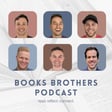
S3.E2 - Blue Zones - Okinawa
This week, Thomas leads our discussion of Chapter 3: The Okinawa Blue Zone from Blue Zones, Second Edition: 9 Lessons for Living Longer From the People Who’ve Lived the Longest by Dan Buettner.
- Which aspects of the Okinawa culture / lifestyle can you see yourself adopting? (1:04 - 17:58)
- What is your individual “Ikigai” (one’s sense of purpose in life) and “Moai” (a group of friends who support and encourage one another)? (17:59 - 33:29)
- Final thoughts on the chapter (33:30 - 34:04)
Resources referenced or discussed in today’s episode
- Happiness and Age graphs - click here
- Study related to the amount of time it takes to develop deep relationships: “How many hours does it take to make a friend?”. Correction: In the episode, it was commented that the study found that men take 200 hours and women take 50 hours to develop deep friendships. Upon further review, the study did not evaluate gender specific timelines; thus, that comment from this episode was inaccurate.
- Article related to discussion on soy consumption and testosterone: “How Much Soy Can You Really Eat Before It Affects Your Testosterone?”
- Video related to discussion of younger generations pushing against the smartphone and social media norms: “Gen Z and millennials turning to flip phones for mental health l GMA”
- Studies related to increased rates of anxiety and depression
- World Health Organization (WHO): “COVID-19 pandemic triggers 25% increase in prevalence of anxiety and depression worldwide”
- Gallup: “U.S. Depression Rates Reach New Highs”
- National Institutes of Health (NIH): “Child and Adolescent Anxiety and Depression Prior to and During the COVID-19 Pandemic in the United States”
Next week we’ll discuss chapter 4: “An American Blue Zone” (pages 123 - 165)
You can buy the book on Amazon by clicking here.
You can also borrow it at your local library. Don’t have a library card, or unsure where your local library is? Search on Google Maps, or find your local library by clicking here.
Follow us on Instagram @booksbrotherspodcast
Connect with us at connect@booksbrotherspodcast.com
Please subscribe and give us a review! We would really appreciate it.
See you next week! Until then - read, reflect, and connect.


